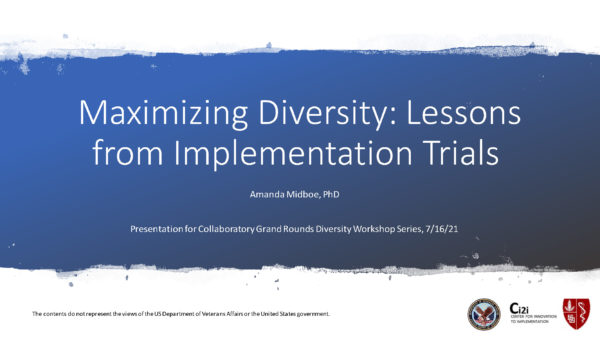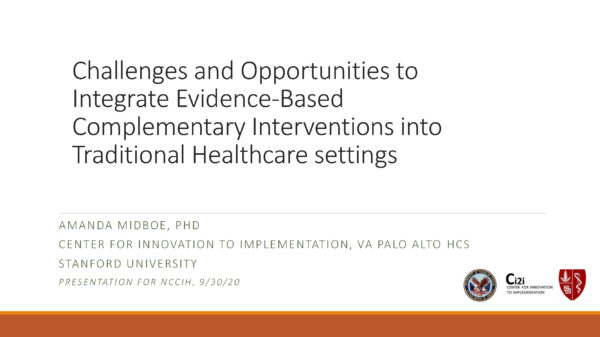Guidance for Study Design & Proposals
A selection of publications, tools, and recommendations for developing strong proposals and adaptive studies
Publications
Patient engagement in designing, conducting, and disseminating clinical pain research: IMMPACT recommended considerations
One of the principal objectives of the Pain Management Collaboratory is to foster a patient-centered approach for the management of pain and common co-occurring conditions in veteran and military health systems. Consistent with this objective, the Collaboratory has prioritized the engagement of persons representing these communities in the design and conduct of the Collaboratory’s pragmatic clinical trials and in the dissemination and implementation of findings from the studies.
This article, “Patient Engagement in Designing, Conducting, and Disseminating Clinical Pain Research: IMMPACT recommended considerations,” articulates the first published recommendations to promote patient engagement for the clinical pain science community. They were developed by an international community of patients, academic scientists, funding agencies, journal editors, and other key partners.
The article emphasizes a paradigm shift in clinical research, particularly in pain studies, towards more inclusive patient involvement. Traditionally, patients were merely subjects in research, but recent trends advocate for their active participation as team members throughout the research lifecycle. This change is driven by the recognition of the unique in sights and value patients add, making research more relevant and practical. Major research funders and regulatory bodies are increasingly mandating such patient involvement. Despite its prevalence in other research fields, patient engagement in pain research is less common. The Pain Management Collaboratory serves as an important model for optimizing patient engagement in clinical pain research.
For more information on the Pain Management Collaboratory Patient Resource Group visit Patient Resource Group – Pain Management Collaboratory.
Writing implementation research grant proposals: Ten key ingredients
Enola K Proctor, Byron J Powell, Ana A Baumann, Ashley M Hamilton and Ryan L Santens
Implementation Science
October 12, 2012
Acknowledging the challenges and nuances of crafting stand-out study proposals that address implementation, the Proctor, et al., recommend important elements for research scientists to include in their grant applications. The authors identify 10 key ingredients that make an application stronger and convey the significance and impact of the proposed study to reviewers.
Analysis of “learn-as-you-go” (LAGO) studies
Daniel Nevo, Judith J. Lok, Donna Spiegelman
The Annals of Statistics
2021, Vol. 49, No. 2, 793–819
What are ways that investigators can plan for study design changes as data accumulates? The authors present Learn-As-you-GO (LAGO) for an adaptive method to apply in stages during a study, and compare against other adaptive designs for trials such as Sequential Multiple Assignment Randomized Trial (SMART) design and Multiphase Optimization Strategy (MOST). Methods are illustrated through the Better Birth Study.
Full Citation
Daniel Nevo. Judith J. Lok. Donna Spiegelman. “Analysis of “learn-as-you-go” (LAGO) studies.” Ann. Statist. 49 (2) 793 – 819, April 2021. https://doi.org/10.1214/20-AOS1978
Effectiveness-implementation Hybrid Designs: Combining Elements of Clinical Effectiveness and Implementation Research to Enhance Public Health Impact
Geoffrey M. Curran, PhD, Mark Bauer, MD, Brian Mittman, PhD, Jeffrey M. Pyne, MD, and Cheryl Stetler, PhD
Med Care
March 2012
The authors examine how hybrid study designs can address the gaps in the translation of health care research to health care practice and health care promotion. The study proposed three approaches and assessed their potential for further consideration in speeding the transition and translation from research studies to health care practices and education.
Increasing the impact of randomized controlled trials: an example of a hybrid effectiveness-implementation design in psychotherapy research
Adrienne L. Johnson, Anthony H. Ecker, Terri L. Fletcher, Natalie Hundt, Michael R. Kauth, Lindsey A. Martin, Geoffrey M. Curran, Jeffrey A. Cully
Translational Behavioral Medicine
November 26, 2018
Randomized Controlled Trials (RTC) have been the go-to for clinical studies; however, the long delays from research to dissemination to health care practice bring about considerations for implementations in study design. The authors conclude that expanding ‘traditional RCTs through collaborative stakeholder contributions and stakeholder/consumer-informed implementation approaches is critical to improve adoption post project.”
Making sense of implementation theories, models and frameworks
Per Nilsen
Implementation Science
April 21, 2015
Nilsen proposes five categories to guide the selection of theoretical approaches to implementation research and practice. This taxonomy aims to help implementation researchers 1) translate research into practice, 2) conceptualize and understand the influences on implementation outcomes, and 3) evaluate frameworks for implementation. Differentiating among and within the aims, models and frameworks is essential for selecting appropriate approaches
Presentations

Maximizing Diversity: Lessons from Implementation Trials
The intent of this presentation is to highlight lessons from implementation trials that can be applied to increase diversity, equity, and inclusion in future trials. There is a focus on stakeholder engagement early and often as well as a reminder to define what diversity means for your particular implementation trial.

Challenges and Opportunities to Integrate Evidence-Based Complementary Interventions into Traditional Healthcare Settings
This presentation outlines some key pieces that are necessary for implementation science grants, including methods and design considerations that are relevant to implementation science.
More Information
Northwestern University's Dissemination and Implementation Program
Northwestern’s Center for Community Health (CCH) and the Center for Prevention Implementation Methodology formed the Dissemination and Implementation Program to provide education, training and consultation to academic and community stakeholders on best practices for translating evidence-based services and programs into clinical and community practice.

